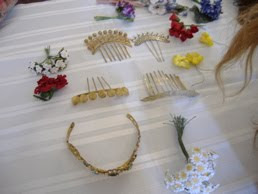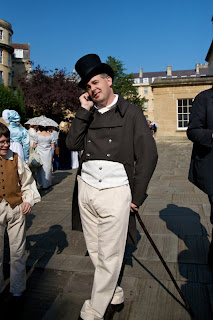 Today I’m talking about one of the favorite occupations (no, not that one) of the Regency gentleman. Now, I’m always flummoxed by what the wealthy and idle did all day, other than change clothes, particularly those gentlemen who seem to have time on their hands in a testosterone-rich, nationalistic era.
Today I’m talking about one of the favorite occupations (no, not that one) of the Regency gentleman. Now, I’m always flummoxed by what the wealthy and idle did all day, other than change clothes, particularly those gentlemen who seem to have time on their hands in a testosterone-rich, nationalistic era.
Boxing, or beating the crap out of each other with bare fists, was a favorite occupation, whether as spectator or participant (although the lines were somewhat blurred). Today is the anniversary of the 1810 match between Tom Molineaux, a former slave from Virginia, and Tom Cribb, the English champion. Cribb won, just. Molineaux’s finger was broken in a fracas with Cribb’s supporters after nineteen rounds. In the twenty-eighth round, Molineaux knocked Cribb out but was accused of hiding lead bullets in his fists, and during the argument Cribb revived and the fight continued. Molineaux slipped and hit his head on one of the ring posts, and fought on, but was beaten in the thirty ninth, or fortieth round. More here.
All good clean fun, according to the official rules of boxing at the time (pre-Queensberry, remember) which were as follows:
- Fights are with bare fists.
- No kicking, biting, gouging, or elbowing.
- Grappling and throws are allowed above the waist.
- A round ends when one fighter is knocked down. Fighters are given 30 seconds to rest, and the next round begins.
- There are no judges to score the bout.
 Yet boxing was regarded as a science, hence Pierce Egan’s definition, the sweet science of bruising, in his work Boxiana. Another English boxing champion, Daniel Mendoza of Portugese-Jewish descent, wrote a Treatize on Boxing. Mendoza was famous for revolutionizing the style of boxing; although he weighed only 160 lbs and stood 5′ 7″ tall, he was the first fighter to actually float like a butterfly and sting like a bee. Eighteenth century style demanded that opponents stood facing each other and just hit each other. Some spectators thought Mendoza’s style ungentlemanly.
Yet boxing was regarded as a science, hence Pierce Egan’s definition, the sweet science of bruising, in his work Boxiana. Another English boxing champion, Daniel Mendoza of Portugese-Jewish descent, wrote a Treatize on Boxing. Mendoza was famous for revolutionizing the style of boxing; although he weighed only 160 lbs and stood 5′ 7″ tall, he was the first fighter to actually float like a butterfly and sting like a bee. Eighteenth century style demanded that opponents stood facing each other and just hit each other. Some spectators thought Mendoza’s style ungentlemanly.
And isn’t it interesting that an openly Jewish boxer and a black boxer found fame in England?
Here’s an excerpt from Improper Relations (February 2010, still 53% off with free shipping, hint, hint) regarding boxing:
Much to my relief, I am not to be the principal in a family drama. My brother George has appropriated that role, stretched upon the couch (his muddy boots still on his feet, something only he and Henry would be allowed to do), while my mama laments and groans, a basin in her hand.
“Why, George, what’s the matter?” I ask.
He sits up. “Capital fellow, Shad!” I see now he has a dreadful black eye, and his appearance is not improved by a beefsteak dribbling blood onto his neckcloth. “Did a few rounds with me at Jackson’s, and you should see his right hook! Tremendous fellow, excellent sportsman, damned fast on his feet—”
My mother makes a tremulous whimpering sound at his strong language.
“Beg your pardon, ma’am,” he continues. “I wasn’t too keen on the idea of you marrying him, Lottie—he’s a trifle high in the instep I thought, for a fellow who’s got an estate in a pretty bad way, won’t enclose, you see, so he’s squandering money on his tenants, bad money after good. Or do I mean good after bad? So—”
“You mean Shad did that to you?” I’m horrified.
“Yes, and he got a few blows in on my ribs. Thought he’d broken one, but it’s not so bad now—”
“Pray, lie down, Dearest Boy,” my mother intones.
She places her basin on a small table to reach for her decanter of cordial.
“Are you completely mad, George?”
He shrugs, the same stupid proud grin on his face. “Damned gentlemanly of him to invite me to a round, that’s all I can say. I’ll be proud to shake his hand and call him brother.”
“But you wanted to kill him last night.”
“Oh, that…” he waves a hand. “We’re the best of friends, now.”
I’m not going to ask you if you’ve hit anyone recently, but what Regency pastimes do you find mindbogglingly idiotic? And which do you think you’d have enjoyed?













